Section 7: LITHUANIA IN THE WORLD


THE VOICE OF INTERNATIONAL LITHUANIA
|
VilNews has its own Google archive! Type a word in the above search box to find any article.
You can also follow us on Facebook. We have two different pages. Click to open and join.
|
Thu, 28th April, 2011 - Posted by - (1) Comment
 |
AMBASSADOR’S POSTCARDToday: From Ambassador Vidmantas Purlys in Ireland |
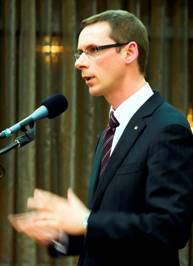
Text: Vidmantas Purlys, Lithuanian ambassador to Ireland
The Easter was dry and sunny in Dublin, and Dubliners were joyful as always during the holidays. The sales of the chocolate eggs were record high, which may have been a pleasant surprise to the chocolate producers in the context of economic difficulties.
Indeed, the economy and finance is a major preoccupation of the Irish government and citizens (or residents, to put it more correctly, given that up to 100 thousand Lithuanians now live and work in Ireland and share the same concerns as Irish, along with Poles, Latvians and other communities).
Tue, 26th April, 2011 - Posted by - (5) Comment

Lithuanian American Council (LAC) Delegation in Conference at Lithuania’s Embassy (LE) in Washington, D.C. 1 April:
>From left to right: Ambassador Žygimantas Pavilionis, Debra Miller (LAC), Rolandas Kačinskas (LE), Paulius Vertelka (LAC), Nida Gelažytė (LAC), Henri Gaidis (LAC), Emanuelis Zingeris (Lithuanias Parliament), Bernice Aviža (LAC), Saulius Kuprys (LAC), (LAC), Bronius Čikotas (LAC), and Simonas Šatūnas (LE)
Photo Inga Lukavičiūtė (LE)
A delegation representing the Lithuanian American Council (LAC) was received at the Lithuanian Embassy in Washington D.C. on April 1, 2011, where it met with the Chairman of the Foreign Affairs Committee of the Lithuania's Parliament, Emanuelis Zingeris and Lithuania's Ambassador to the United States, Zygimantas Pavilionis.
In the course of the meeting LAC representatives expressed their concern on a wide range of topics including Lithuania's developing energy policy, the country’s image in the international community, emigration issues and their demographic impact, the prospect of maintaining citizenship rights of recent immigrants, ongoing cooperation between organizations of the Diaspora and Lithuania, and minority issues in Lithuania. LAC representatives suggested that Lithuania would benefit significantly by availing itself of the expertise and knowledge found in the Diaspora communities in developing energy and security policies and a host of other areas such as environmental issues, ecology, medicine, economic development, and the promotion of improved interactions between the government and the people through non-governmental organizations.
Wed, 20th April, 2011 - Posted by - (1) Comment
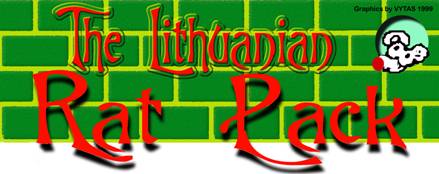
The Lithuanian Rat Pack was founded in the U.S. in July 1999 as a discussion group by Rimgaudas Petras Vidziunas Mesa, Arizona USA. Any type of discussions relating to culture, history, current events, politics, economics, genealogy, geography, books, poems, travel, visas about Lithuania are allowed. Golden rule is "thou shall not speak evil of another Lithuanian".
Lithuanian-American Club activities are announced. Growing up Lithuanian in the Americas stories are encouraged.
The Lithuanian Rat Pack started and still is on yahoogroups.com.
They also have a Facebook page:
http://www.facebook.com/pages/The-Lithuanian-Rat-Pack/293010015300
Join them and have some fun!
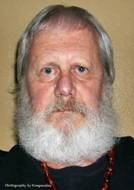
Rimgaudas P. Vidziunas
Mesa, Arizona
USA
Other Lithuanian organisations and Lithuanian genealogy websites in the U.S.
LITHUANIAN GENEALOGY

Lithuanian Global Genealogical Society
Lithuanian Global Genealogical Society (LGGS) is a non-profit society that provides this site for the use of LGGS members, fellow genealogists, and those just starting their research on Lithuania, and family genealogy. Our mission is to collect, preserve, and disseminate knowledge and information about Lithuanian genealogical and related historical, biographical, and heraldic data; to inculcate and promote interest in accurate research in these fields; to issue publications in various forms of media; and to encourage, promote, and provide genealogical education and scholarly training for all interested in these endeavors. The society is composed of a host of volunteers who take time out of their ordinary lives to further our mission.
LITHUANIAN ORGANISATIONS IN THE U.S.

Lithuanian American Community, Inc.

Lituanus (English)
Journal dedicated to Lithuanian and Baltic art, history, language, literature, and other cultural topics, published by LAC
Lithuanian Foundation, Inc. (Lithuanian)
Lithuanian Foundation, Inc. (English)
Arizona Chapter of Lithuanian-American Community, Inc.
California Lithuanian Community
Philadelphia Area Lithuanian-American Community
Los Angeles Lithuanian Community
Lithuanian-American Community of Minnesota (LACMN)
Lithuanians in Florida
Lithuanian American Community, Inc. - New York District
Save Our Lady of Vilnius
Portlando Lietuvių Amerikos Bendruomenò (Portland)
Lithuanian-American Community Inc. - San Diego Chapter
Washington Chapter of Lithuanian-American Community, Inc.
Lithuanian-American Community of Colorado
Cleveland's Lithuanian Community
Sat, 16th April, 2011 - Posted by - (8) Comment
By Gintautas Kaminskas
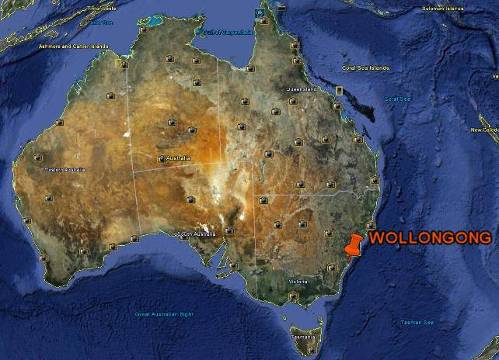
Gintautas Kaminskas lives in Wollongong, Australia. Throughout his life, since his teenage years, his dream and hope was to settle in an independent Lithuania, the country his parents fled during the Second World War. He kept the dream of his ancestors' country alive through many post-war years and in 2008 his dream finally came through; Gintautas moved to Lithuania. Towards the end of 2009 he returned to Australia, disillusioned and sad to have experienced a country totally different from what he had imagined and hoped for. I asked him to explain why.
Here is his story:
I usually don’t like to talk about my family’s story, because most people don’t understand. But I can tell from what you write that you are an idealist and you are trying to understand Lithuania and Lithuanians so I will tell you my story, briefly.
I will start by mentioning that I have a friend in Iceland and I tell him (probably ad nauseam!) that he should be ever so grateful that he was born in his own normal (unoccupied) homeland and therefore automatically grew up speaking his native language in his home, at school at work, and automatically married a woman of his own nationality and therefore naturally spoke his native language at home with his wife and children and now grandchildren. I had none of those privileges.
My parents were married in Kaunas in 1943. If Lithuania had been a Scandinavian country, I would have grown up in Kaunas, happily, and would probably still be there today with my Lithuanian wife and children and grandchildren, just like my friend Jóhann in Reykjavík. But no, not for me. Having experienced one Russian occupation already (1940-1) and having narrowly escaped deportation to Siberia the first time (some of our extended family members weren’t so lucky), my parents decided to flee to Germany in June 1944, just as the Russians were trying to re-occupy Lithuania. My mum was pregnant with my sister, who has born in Germany in November 1944. I was born there (München) on 15 February 1948 (one day short of Vasario 16-toji, unfortunately).
When I think back, I wish my parents had been able to stay in Germany; at least I would have grown up European, close to the languages and countries that are my passion. But no such luck. All the displaced persons had to go elsewhere.
Thu, 14th April, 2011 - Posted by - (0) Comment
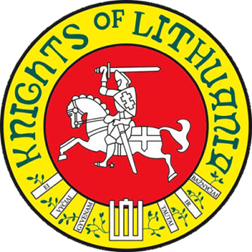
The Knights of Lithuania is an American organization of Roman Catholic men and women of Lithuanian ancestry and their spouses. Adhering to the motto: "For God and Country";, the Knights of Lithuania aim to keep alive among its members an appreciation of the Lithuanian language, customs and culture while also stressing the importance of Roman Catholic beliefs.
Organized on 27 April 1913, the Knights of Lithuania were begun as a youth organization. Its purpose was to unite the Lithuanian youth living in the USA, and through them, preserve Lithuanian culture and restore freedom to Lithuania, then divided between Russia and Germany. It has since become a family organization. St. Casimir, patron saint of Lithuania's youth, is honoured as the organization's patron.
Read more at: http://www.knightsoflithuania.com/
and: http://republicanherald.com/news/knights-of-lithuania-hold-regional-meeting-in-frackville-1.1130806…
Tue, 5th April, 2011 - Posted by - (2) Comment


A rickety old bus runs past me in a busy, polluted Mumbai street. Suddenly I see a little girl's face in one of the bus windows. The contrast between the old bus and the beautiful child is striking. We are in India!
Tue, 5th April, 2011 - Posted by - (21) Comment

Professor Lokesh Chandra, one of India’s leading experts on Sanskrit and Buddhism
It’s early morning in Delhi. I have been invited to the small, dark office of Professor Lokesh Chandra, one of India’s leading experts on Sanskrit and Buddhism. “The same year I was born, 1927, my father went to London to get a degree in Lithuanian language. He spoke the language fluently, but he never visited Lithuania,” tells the elderly professor, still with his Kashmir coat and cap on despite the outside temperature of close to 30° Celsius.
I soon learn that the professor’s knowledge about the connections between Old Sanskrit and Lithuanian language and ancient cultural ties between India and Lithuania is nothing but amazing. He confirms that there since ancient times have been unique ties between India and Lithuania, not only with regards to language. Also the songs, the medieval cultures and more were extraordinary closely connected to each other.
Here is what he tells me this early morning at his New Delhi office: “The very mention of Lithuanian opens up an image, a vision that gives a people their identity through language. It shows how the darkness of dreams becomes the new embodied hope. My father was stimulated and strengthened in his work on the development of Hindi by the history of Lithuanian language. It has been the eternal continuity of these people; - it rustles something deep in their being. My father felt that we in India share with our distant Lithuanian brothers the silent geography of lost frontiers. Political freedom is inseparable from language.”
Tue, 15th March, 2011 - Posted by - (2) Comment
|
1918 |
1990 |
|
|
1991 |
2011? |
There has, as I see it, been three distinct unification processes that took place in Lithuania over the latest 100 years – in February 1918, March 1990 and in January 1991. These unification processes have had an enormous impact on Lithuania as a nation, and this country could easily have been looking very differently today had it not been for the fact that the nation's people and leaders, at these three important moments, so clearly manifested that Lithuania demanded to be a free, independent country with norms, values and dreams based on the country’s long and proud historical background and the many characteristics that had made this country and its people precisely the nation called Lithuania.Those qualities are what made Lithuania a great force of progress and prosperity in human history.
What is required now is for this country to again pull together, confront boldly the challenges we face, and take responsibility for own future once more.
The challenge this time is totally different from the three previous times. We are this time not challenged by threats from aggressive neighbours, but rather by internal resolution and lack of involvement within the nation's own population. What we see today is almost a kind of lethargy.
The challenge is not diminished by the fact that the country's population now is scattered all over the world.
Sun, 9th January, 2011 - Posted by - (4) Comment

Regina Narusiene, President of the World Lithuanian Community
In this exclusive interview with VilNews, American-Lithuanian Regina Narusiene says that se feels she has always been personally well received in Lithuania:
“Recently however, I've heard some in Lithuania say that Lithuania does not need or want our help. Still I see significant reluctance to improve the country's legal systems. It seems that some of the country's leaders simply are not ready to or interested in implementing urgently needed reforms. I am saddened to see the public’s perception that rule of law is still not working effectively in Lithuania." Regina sighs a little deflated when she shares those thoughts with me.
I ask her to express some thoughts on what it takes to get Lithuania to grow stronger and better over the years to come. I'll let her words finish my report:
"Let me first say that it is deeply tragic to see so many young, talented and beautiful people leave this country. Some say that it is now no longer talk of emigration, but evacuation. It is therefore obvious that much more must be done to pave the way for good jobs and opportunities for the country's younger population. But it is also my opinion that we need a shift in mindset among some of the country's leaders.”
“Last but not least, I yearn to see far more of the population, young and old, engaged in voluntary public oriented organizations and activities. That is exactly what democracy for a large part is about, and it does not take much. Lithuania's people should begin to take such initiatives themselves. A good, democratic society consists of people who give of themselves to help each other. Lithuania has unfortunately still a long way to go in this respect.”
“I will conclude by saying that it is important for the nation to maintain good relations with all Lithuanians, and their descendants, now living in other countries.”
“Lithuania needs a new global strategy, and we in the ‘Lithuanian World Community’ will do our utmost to contribute to such a strategy. Lithuania has an enormously large group of smart Lithuanians and good hearts outside the country, and it is important that Lithuania invite to dialogue with them and seek their support and input to promote a better future for Lithuania, the country we all love. "
Sun, 9th January, 2011 - Posted by - (2) Comment

Why is Lithuanian citizenship so important to Lithuanian emigrees ? The reasons why so many emigres posses a desire to regain and to maintain citizenship status with their country of origin are many. First and foremost, citizenship is the most important real tie to their homeland , for which they continue to posses an abiding love and affection. It is a symbol, if not tangible, and marker of one‘s identity throughout the world.
Sun, 9th January, 2011 - Posted by - (1) Comment
The Lithuanian World Community (Lithuanian: Pasaulio lietuvių bendruomenė or PLB) is a non-governmental and non-profit organization established in 1949 that unifies Lithuanian communities abroad. The Constitution of the Lithuanian World Community declares that it consists of all Lithuanians living abroad. The Community is active in 36 countries, including representation in Lithuania. …
Sun, 9th January, 2011 - Posted by - (0) Comment
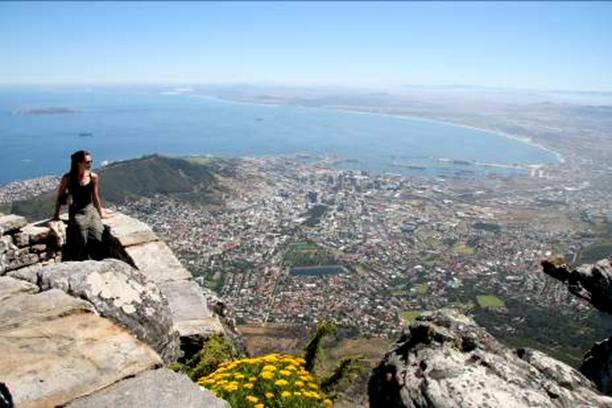
Cape Town was the first stop for most of the Lithuanian Jews who emigrated to
South Africa during the period 1860 – 1940.
The Jewish Museum in Cape Town offers visitors a journey back in time. Most museums do. The striking feature of this museum, however, is that the journey to the past also brings us to a completely different part of our world, from Africa’s southern tip to a seemingly modest little country far to the north, to a country where around 90% of South Africa’s Jewish population has its roots (there are today about 80,000 Jews in South Africa).
Sun, 9th January, 2011 - Posted by - (0) Comment
 |
AMBASSADOR’S POSTCARDToday: from Ambassador Darius Degutis in Israel |

Ambassador Darius Degutis.
VilNews will over the coming months invite a number of foreign ambassadors to write commentary articles. What we want to learn more about is what characterizes the cooperation between Lithuania and the country the diplomat serves in. We would like also to know more about daily life at the embassy in question, and we are eager to listen to the ambassadors’ thoughts and opinions on current topics and news here in Lithuania as well as the country he/she serves in.
First to write, is the Lithuania’s ambassador to Israel, Ethiopia and South Africa, Darius Degutis.
Ambassador Darius Degutis
Graduated from Vilnius University in 1986. Began his work career in the International Chamber of Commerce, Lithuania Branch. Later export Manager for the company Audėjas. Joined the Lithuanian Ministry of Foreign Affairs in 1991, Nordic countries department. Was appointed Counselor and Deputy Head of Mission to the Lithuanian Embassy in Denmark, 1992. 1998-2001: Deputy chief of mission at the Lithuanian Embassy in USA. 2001-2004: Ambassador in Poland. 2009: Appointed Ambassador of Lithuania to the states of Israel and South Africa.
D. Degutis was awarded the Order for Merits to Lithuania the Commander’s Cross.
Sat, 7th August, 2010 - Posted by - (2) Comment

Distribution of Lithuanian-Americans according to the 2000 census
It is believed that Lithuanian emigration to the United States began in the 17th Century when Alexander Cursius arrived in New Amsterdam (present day New York) in 1659 and became the first Latin School teacher-administrator; he was also a physician. Persons with Lithuanian surnames served under George Washington, and even Thaddeus Kosciuszko wrote that he came “from Lithuania in Poland” and later became Brigadier General and a hero of the American Revolution. There is also evidence that Lithuanians fought in the American Civil War (1861-65) in both armies, the North and the South.
Sat, 8th May, 2010 - Posted by - (1) Comment

Vic Pakalnis
Vic Pakalnis here. I was born a Lithuanian – Canadian in a small northern mining town , Malartic , Quebec . My parents Vytautas Pakalniskis and my mother Elena Tamasauskas came to Canada after World War II . They met and married and I was born in 1950. My grandparents also came over at the same time : Simas and Elena Tamasauskas . They taught me Lithuanian at home ; I learnt French on the street from friends and English when I went to school . My grandparents told me of the glories of ancient Lithuania but also of the hard times under the Nazis and then the Bolsheviks. It was a sad tale they recounted – my grandfather’s brother was a priest that was sent off to Siberia never to return. I recall aunts and uncles that had settled in Detroit , Michigan sending packages back home and the stories of misery under Soviet rule . My parents and grandparents never did see Lithuania again and I certainly had misgivings about visiting but with my 60th birthday approaching , my “ Bucket List” beckoned , I decided to go to Vilnius with my 19 year old son , Peter . This was last summer: June 2010. The journey back home to a place I only imagined for many many years.
Thu, 1st April, 2010 - Posted by - (2) Comment
One of our most avid readers – in Michigan, USA,
bought a new car and new license plate a few days ago.…
VilNews e-magazine is published in Vilnius, Lithuania. Editor-in-Chief: Mr. Aage Myhre. Inquires to the editors: editor@VilNews.com.
Code of Ethics: See Section 2 – about VilNews. VilNews is not responsible for content on external links/web pages.
HOW TO ADVERTISE IN VILNEWS.
All content is copyrighted © 2011. UAB ‘VilNews’.